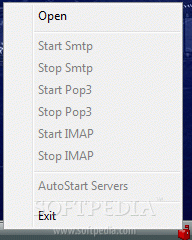ISMail 1.8.888 Crack With License Key 2025
ISMail is an email server for Windows with ESMTP/POP3/IMAP4 and Webmail.ISMail is easy to setup at home or in the office. With default settings, it can be up and running in minutes.
For advanced users, it supports multiple domains, unlimited mail accounts, account quotas, mailing groups, anti-spam content filters, anti-virus scanners, IP-based access control, open relay protection, SMTP authentication, statistics, Windows Services, and log files.

Download ISMail Crack
| Software developer |
InstantServers
|
| Grade |
2.9
1028
2.9
|
| Downloads count | 8883 |
| File size | < 1 MB |
| Systems | Windows All |
On-line help is available for testing network and server configuration.
An Uninstaller is also included.
Here are some key features of "ISMail":
■ Unlimited Accounts
■ Unlimited Domains
■ ESMTP, POP3, IMAP4 servers
■ Account Quotas
■ Anti-Spam Filtering
■ Anti-Virus Scanner Support
■ Mail Groups / Forwarding
■ Security
■ SMTP Authentication
■ Webmail (free plugin)
■ Windows Administration (Win32 GUI)
■ Works with any mail client (e.g. Outlook, Eudora)
■ Works with web-based mail services (e.g. Mail2Web)
■ Account Disable: disable sending from an account, while still allowing 'read' access.
■ Account Forwarding: redirect or forward messages to one or more email address Optionally keep a copy of messages in the account being forwarded.
■ Account Quotas: limit mailbox sizes. Define for entire system, per domain, and/or per account.
■ Account Unknown: account 'nobody' will accept messages to unknown accounts on a domain. Messages can be stored in this account or forwarded to any email address. (If 'nobody' does not exist, messages to unknown accounts are refused).
■ Anti-spam Filters: built-in and custom content filters. 'Mark' message headers or remove unsolicited messages. Global, domain, and user-configurable filter settings.
■ Anti-Virus Scanner: runs any command-line anti-virus scanner on all messages (incoming and outgoing).
■ Authentication: controls access to ISMail (types of Authentication include: Login, Trusted IPs, and SMTP Authentication).
■ Autoresponders: each account can automatically send a response when a message is received.
■ Connections: supports parallel connections (both incoming and outgoing)
■ Configuration Checker: on-line tool checks network and mail server configuration.
■ DNS Auto-configuration: automatically chooses two (2) internet 'root' DNS servers if the actual DNS servers are not known.
■ Email Client Compatibility: works with all major email programs (e.g. Netscape Messenger, Eudora, Microsoft Outlook Express).
■ Encryption: POP3 and IMAP4 servers support CRAM-MD5 encrypted logins.
■ Firewall/Router/Proxy Server Compatible: works with major firewalls, routers, and proxy servers.
■ IP-based Addresses: mail may be sent or received using IP addresses (e.g. 'user@[1.2.3.4]' send mail to the IP '1.2.3.4').
■ IP-based Domains: one or more domains may be set to use specific IP addresses (on machines with multiple IPs).
■ IP Blocking: deny connections for one or more IP addresses.
■ Logging: mail and content filter transactions are logged. User control over logging detail.
■ Login Authentication: a POP3/IMAP4 account login can be used for Authentication.
■ Mail Groups: use account forwarding to define groups (or lists) of mail accounts which will receive copies of messages sent to group account names
■ Message Delivery Delay: sender is notified if message has not been delivered after 1 day.
■ Message Bounce: sender is notified if message can not be delivered after 7 days.
■ Message Loop: checks messages for internal mail 'loops' before sending.
■ Multiple Domains: one or more domain names can be used. Each domain has unique mail accounts.
■ Multithreaded Operation: simultaneous message I/O for improved performance.
■ Open Relay List (ORL): checks internet service for IP addresses to be denied mail access.
■ Open Relay Protection: Authentication must be provided before sending mail.
■ Real-time Blackhole List (RBL): checks internet service for IP addresses to be denied mail access.
■ Reverse DNS Check: verify that sender has reverse DNS entry. Helps protect against invalid senders.
■ SmartHost: send messages directly to another mail server. Avoids dynamic IP, 'reverse DNS lookup', firewall, and port blocking issues. SmartHost may be used for all messages, or only when message delivery fails. SMTP Authentication may be used with SmartHost.
■ SMTP Authentication: supports PLAIN, LOGIN, NTLM, and/or CRAM-MD5 authentication methods with SMTP and SASL.
■ Statistics: real-time statistics are kept for major SMTP server subsystems.
■ Security: multiple types and levels of security control guard against attack and unauthorized access.
■ Trusted IPs: one or more 'trusted' IP addresses may be used for Authentication.
■ Unlimited Storage: local hard disk provides storage for user mail.
■ Virtual Domains: more than one domain can share the same server IP address.
■ Web-based Mail Service Compatibility: works with web-based mail services (e.g. Mail2Web)
■ Webmail: access mail with a web browser using free ISMail Serial plugin
■ Windows Services: run mail servers as Windows Services on NT/2000/XP/2003.
Requirements:
■ A domain name and DNS service for the domain is required ('MX' records are optional).
■ ISMail requires that external machines be able to access ports 25 (SMTP), 110 (POP3), and/or 143 (IMAP4).
Limitations:
■ 30 days trial
